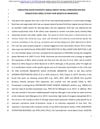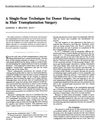 17 citations,
October 2002 in “Dermatologic Surgery”
17 citations,
October 2002 in “Dermatologic Surgery” Successful surgical hair restoration requires careful planning, precise execution, and proper aftercare, using techniques like follicular unit transplantation and correct hair angling for best cosmetic results.
2 citations,
September 2011 in “InTech eBooks” The document outlines steps for moving fat from one body part to another.
9 citations,
April 2018 in “Biology of reproduction” Diet changes hormone levels in pregnant ewes by affecting metabolism, not placental synthesis.
January 2024 in “Medicina” Proper planning and technique in upper-face feminization surgery are crucial to avoid complications and revisions.
1 citations,
January 2024 in “Pharmaceuticals” A new carrier improves skin delivery of tofacitinib for treating inflammatory skin diseases.
1 citations,
January 2021 in “Processes” Researchers successfully grew horse skin cells that produce pigment from hair follicle samples.
 1 citations,
December 2010 in “Elsevier eBooks”
1 citations,
December 2010 in “Elsevier eBooks” Cell transplantation faces challenges in genitourinary reconstruction, but alternative tissue sources and microencapsulation show promise.
 6 citations,
January 2009 in “Elsevier eBooks”
6 citations,
January 2009 in “Elsevier eBooks” The skin has multiple layers and cells, serves as a protective barrier, helps regulate temperature, enables sensation, affects appearance, and is involved in vitamin D synthesis.
 2 citations,
March 2021 in “Journal of Cosmetic Dermatology”
2 citations,
March 2021 in “Journal of Cosmetic Dermatology” Umbilical cord-derived media is safe and effective for hair growth.
 January 2018 in “bioRxiv (Cold Spring Harbor Laboratory)”
January 2018 in “bioRxiv (Cold Spring Harbor Laboratory)” Auxin helps root hairs grow in high phosphate by affecting ROS and involving RSL2 and RSL4.
 13 citations,
December 2014 in “Stem Cells”
13 citations,
December 2014 in “Stem Cells” Hair and skin can regenerate without bulge stem cells due to other compensating cells.
 4 citations,
January 2021 in “Dermatologic Therapy”
4 citations,
January 2021 in “Dermatologic Therapy” AI is effective in diagnosing and treating hair disorders, including detecting hair loss and scalp conditions with high accuracy, but it should supplement, not replace, doctor-patient interactions.
 41 citations,
May 2018 in “Nutrition and healthy aging”
41 citations,
May 2018 in “Nutrition and healthy aging” Skin aging is largely due to differences in stiffness and elasticity between skin layers, leading to wrinkles.
 October 2017 in “The Indian Journal of Animal Sciences”
October 2017 in “The Indian Journal of Animal Sciences” The prolactin gene polymorphism doesn't affect cashmere quality in these goats.
 42 citations,
April 2008 in “Acta materialia”
42 citations,
April 2008 in “Acta materialia” Different ethnicities and treatments affect human hair strength and structure.
 31 citations,
September 2012 in “Human Brain Mapping”
31 citations,
September 2012 in “Human Brain Mapping” People with Seasonal Affective Disorder have different brain activity in certain areas when resting.
 26 citations,
December 2020 in “Nature metabolism”
26 citations,
December 2020 in “Nature metabolism” Rapamycin treatment helps with mitochondrial disease by reducing PKC levels.
 15 citations,
July 1991 in “International Journal of Dermatology”
15 citations,
July 1991 in “International Journal of Dermatology” Laser Doppler velocimetry is a valuable noninvasive tool for skin blood flow research in dermatology.
 6 citations,
March 1996 in “The American Journal of Cosmetic Surgery”
6 citations,
March 1996 in “The American Journal of Cosmetic Surgery” A new hair transplant method creates one appealing scar, uses donor hair better, and speeds up surgery.
 1 citations,
July 2022 in “Case reports in endocrinology”
1 citations,
July 2022 in “Case reports in endocrinology” A 70-year-old woman with a malignant adrenal tumor improved after surgery and radiotherapy.
 1 citations,
June 2010 in “Expert Review of Dermatology”
1 citations,
June 2010 in “Expert Review of Dermatology” Covers common skin issues in kids, their diagnosis, treatment, and need for specialist care.
 260 citations,
July 2010 in “Cell”
260 citations,
July 2010 in “Cell” Mutations in the SRD5A3 gene cause a new type of glycosylation disorder by blocking the production of a molecule necessary for protein glycosylation.
 71 citations,
January 2014 in “Journal of Proteome Research”
71 citations,
January 2014 in “Journal of Proteome Research” Women with PCOS have different levels of certain fats and proteins in their blood, which could help diagnose the condition.
 33 citations,
June 2007 in “International Journal of Pharmaceutics”
33 citations,
June 2007 in “International Journal of Pharmaceutics” The conclusion is that measuring how drugs partition into artificial sebum is important for predicting their delivery into hair and sebaceous follicles, and it provides better information than traditional methods.
 15 citations,
November 2020 in “Pharmaceutics”
15 citations,
November 2020 in “Pharmaceutics” Tofacitinib nanoparticles can safely and effectively treat alopecia areata by targeting hair follicles.
 4 citations,
May 2021 in “Molecules”
4 citations,
May 2021 in “Molecules” The hair test for vitamin D could be a useful alternative to blood tests, providing a longer-term vitamin D status, but more research is needed.
 72 citations,
September 1997 in “Dermatologic Surgery”
72 citations,
September 1997 in “Dermatologic Surgery” Careful planning and patient counseling can lead to excellent hair transplant results, often in one or two sessions.
 36 citations,
January 2019 in “Nature communications”
36 citations,
January 2019 in “Nature communications” High lactate dehydrogenase activity is not necessary for the growth of squamous cell carcinoma.
 32 citations,
March 2013 in “Journal of Pharmaceutical Sciences”
32 citations,
March 2013 in “Journal of Pharmaceutical Sciences” Iontophoresis improves minoxidil delivery for alopecia treatment.
 23 citations,
March 1988 in “Biochemical Pharmacology”
23 citations,
March 1988 in “Biochemical Pharmacology” Minoxidil stops cells from making prostacyclin, which may help with hair growth. More research is needed.
























